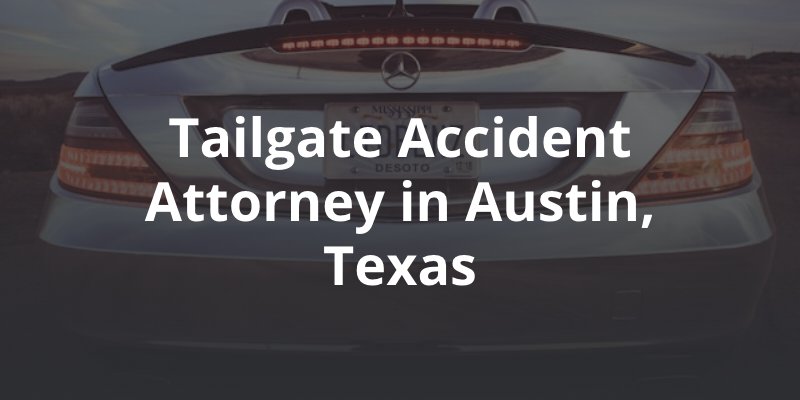Tailgating is a common problem on Austin roads and highways, especially in congested traffic. Frustrated drivers may follow other vehicles too closely and pose a risk of accidents such as rear-end collisions. If you get involved in a tailgating accident, you may be able to hold another driver responsible. Get help from an Austin car accident attorney to ensure a smooth claims process.

Tailgating refers to a motor vehicle driver driving too close to the back of another car. Texas Transportation Code §545.062 states: “An operator shall, if following another vehicle, maintain an assured clear distance between the two vehicles so that, considering the speed of the vehicles, traffic, and the conditions of the highway, the operator can safely stop without colliding with the preceding vehicle or veering into another vehicle, object, or person on or near the highway.”
All drivers have a duty to obey this law and maintain enough distance between their vehicles and others to reasonably prevent collisions based on the circumstances and traffic or road conditions. Following another vehicle too closely is an example of driver negligence, or the failure to act with proper care. Tailgating can also cross the line into reckless driving if it wantonly endangers the lives of others.
Keeping a proper following distance is important because it allows a motor vehicle driver enough space to stop in time to prevent an accident. Drivers need distance between their vehicles to react safely to changing roadway situations, such as a stopped car or road hazard.
Tailgating impedes a driver’s ability to stop in time to avoid a collision. This significantly increases the risk of accidents such as rear-end collisions, chain reaction crashes, and override and underride accidents involving large trucks.
Texas is a fault state, which means you must determine who is at fault for an automobile accident before you can file a car insurance claim. In most accident cases involving tailgating, the driver in the rear vehicle is held accountable. It is the rear driver’s duty not to follow too closely and to pay enough attention to the road to react quickly to hazards.
Driver errors such as distracted driving, texting and driving, drowsy driving, driving while intoxicated, speeding, making unsafe lane changes, and following too closely can all result in a preventable crash. A driver who was following too closely at the time of the collision can be held responsible, or liable, for a victim’s injuries and related losses.
A driver can be liable whether he or she made a careless mistake or intentionally tailgated another driver due to aggressive driving or road rage. If a reasonable and prudent driver would have maintained a greater following distance, tailgating can be viewed as an act of negligence that makes the rear driver responsible.

There are rare circumstances where the driver in front could face liability for a tailgating accident; for example, if that driver made an unsafe lane change or cut the rear driver off. Vehicle maintenance problems, such as brake lights that aren’t working, could also place fault with the frontmost driver. If you believe you were not at fault for a tailgating accident in Austin, contact an attorney for assistance establishing the other driver’s liability.
Being involved in a tailgating accident can be confusing and overwhelming. Hiring a car accident attorney from the beginning of your case can give you the peace of mind that you need to focus on healing. Your Austin personal injury attorney can investigate the crash, determine fault, collect evidence, hire experts and negotiate with car insurance companies on your behalf while you rest and recover.
For a free tailgating car accident case review with an experienced attorney, contact FVF Law Firm at (512) 640-2146. We have over a century of combined legal experience and will educate you on your legal rights and options.
Tailgating refers to following another vehicle too closely, which reduces the reaction time available to prevent a collision if the lead vehicle slows down or stops suddenly. Tailgating is dangerous because it increases the likelihood of rear-end collisions, which can cause serious injuries, especially at higher speeds. At FVF Law, we’ve handled many cases where tailgating led to severe injuries, and we’re here to help victims pursue justice.
After a tailgating accident, ensure everyone’s safety and call 911 if anyone is injured. Document the scene by taking photos, gathering witness information, and exchanging details with the other driver. It’s also important to seek medical care even if injuries seem minor, as some conditions worsen over time. For legal guidance, contact FVF Law for a free consultation with our experienced attorneys.
Proving tailgating can involve several types of evidence, such as witness statements, dashcam footage, and traffic camera footage, if available. In some cases, accident reconstruction experts may be needed to determine the following distance and establish fault. FVF Law can assist in gathering and analyzing this evidence to build a strong case on your behalf.
In most cases, the driver who was tailgating and rear-ended the vehicle in front is considered at fault for the accident. Texas law requires drivers to maintain a safe following distance. However, each case is unique, and multiple factors may affect liability. FVF Law’s attorneys can help you understand the specifics of liability in your case.
Victims of tailgating accidents may be entitled to compensation for medical expenses, lost wages, pain and suffering, property damage, and more. In severe cases, compensation for long-term care and rehabilitation may also be available. FVF Law can help evaluate the types of compensation you may be eligible to pursue.
Getting started with FVF Law is easy—just contact us to schedule a free consultation. Our experienced team is ready to assess your case, answer your questions, and explain your options for pursuing compensation after a tailgating accident.